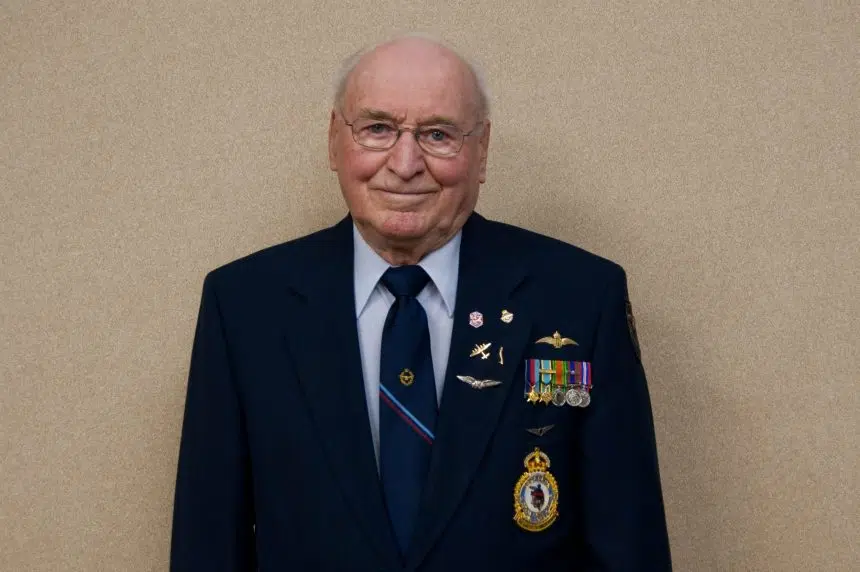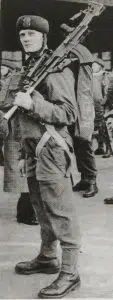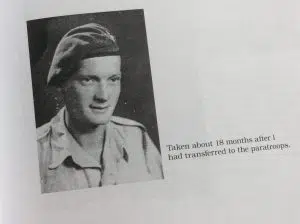On May 8, 1945, Allied forces declared victory in Europe.
Beyond the now-iconic images of celebrations on the streets on VE Day, some men who fought for that victory recall the relief of being reunited with their own families and their grief over so many others who never had the chance to come home.
By May of 1945, Reg Harrison had returned to his home in Saskatchewan, discharged from the air force a few months before VE Day.
Looking back 75 years later, he explains why he didn’t really celebrate the end of the war, because he was thinking of the friends and neighbours who didn’t make it.
“Where I came from, there were quite a few (men) within maybe 20 or 30 miles, probably more than 10 or 12 that never actually came home, and that’s where my thoughts were,” Harrison said. “My thoughts were with them and their parents because there’s so many that were killed that have no known graves.”
For Regina veteran Charlie Cox, memories of the end of the war are complicated.
He said he felt it was all over for him when his paratrooper unit was captured by the Germans in Holland after landing as part of Operation Market Garden in September of 1944.
Cox was sent to a prisoner of war camp in eastern Germany and then spent the final months of the war starving as German guards marched the prisoners back across Europe, fleeing the advancing Russians on the Eastern Front.
When the POWs were finally liberated by American troops on April 14, 1945, Cox did an interview in which he realized the date was one day before his mother’s birthday. So he sent her a telegram saying he would be home soon.
After months of uncertainty with a son missing in action and no records to show he had been captured or killed, Cox’s mother got the greatest birthday gift that year: The news that he was alive and relatively unharmed, just a little bit lighter.
“It was a great relief,” Cox said of being liberated and reunited with his family first and later learning the war was finally over.
‘I’m one of the lucky ones:’ Saskatoon veteran reflects on heroes who were lost
When the Second World War began, Harrison stopped driving a team of horses on the family farm near Melville, joined the air force and started flying a plane.
He remembers doing training flights from Yorkton over his farm. When he was deployed to England, the difference in flying was night and day.
“It’s a small country but there were thousands of planes in the air all the time,” Harrison recalled from his home in Saskatoon, noting how thousands of airmen died in accidents because there were always so many planes in the air.
“You can imagine when they’d have a bomber raid with 800 or 900 bombers and when you got to England, everything was blacked out. You couldn’t have any navigation lights on your plane (and) all the houses were blacked out.”
Looking back, Harrison said he never realized that more than half of the airmen he trained with would never come home.
“I survived four plane crashes,” he said, “so I’m one of the lucky ones.”
Harrison knows of a memorial north of London listing the names of 17,000 airmen without known graves. His thoughts often go to those families who were left to wonder where the final resting place of their son is.
“I always think of the ones that never came home, that paid the supreme price, that they’re the ones who are the real heroes,” Harrison said.
On this 75th anniversary of VE Day, while people are caught in the middle of a global pandemic, Harrison hopes they’ll remember to be grateful for what they have thanks to generations who fought for freedom.
“People should be more tolerant, they should listen more, they should have more empathy,” Harrison said, and rather than focusing on material things, he hopes people can turn their thoughts to those who are much less fortunate than they are.
Province marks the occasion
Lt. Gov. Russ Mirasty and Premier Scott Moe laid wreaths at the Saskatchewan War Memorial on Friday to commemorate the end of the war in Europe.
“On May 8, 1945, the Allies accepted Germany’s surrender and after six long years of fighting, the Second World War came to an end in Europe,” Mirasty said in a media release.
“As the years pass, it becomes increasingly important that we remember the Canadians who served. We owe them our deep gratitude. Please take a moment today to remember them, and to honour their legacy of peace.”









